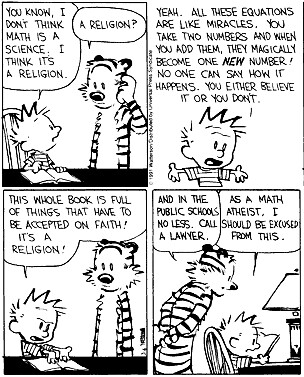My "Anonymous" commenter has graced my blog once again. I'll block quote him here for simplicity:
It all depends what you mean by "exist" and "true". I don't think the number 3 exists (point to it) in the same sense that you exist. And as for propositions, consider two propositions "Toronto is in Canada" and "There are infinitely many prime numbers". How much of the truth of a statement depends on how we ascertain its truth?
For purposes of my last entry "exist" was defined as "having casual power or a physical location in space." I admit that this is a very restrictive definition of the term that does not allow for the "existence" of numbers or other abstract concepts. That was a mistake. Numbers certainly do exist, even if they are only constructs of the human mind.
[On a side note, I was going to make a joke about how I had become a "numeral agnostic" because of my belief that it was impossible to prove the physical existence of numbers or the mental construct of numbers in my mind or anyone else's. Or possibly that I had rejected number theory and become an adherent of numerical formulation.]

Now, how much of the truth of a statement depends on how we ascertain its truth?
I freely admit that I haven't studied epistemology in depth yet. I think it is fair to say that there are different methods of ascertaining truth. However, if any part of that method is illogical or fallacious, then the result of that line of reasoning is likely to be illogical or fallacious as well. Truth is not a democracy; unalterable facts are not open to debate. (Technically they are, but the decision of a committee won't change the fact itself.)
As a point of interest, I've been reading about Empiricism and Methodological Naturalism lately.
Editor's Note:
I was originally going to write this post based around the joke, but that was over a month ago. As I opened up the draft tonight I ended up addressing the question anyway. It's about time I finished it. Next time: Procrastination, Academia, and angst. (Emo?)
1 comment:
"Now, how much of the truth of a statement depends on how we ascertain its truth?"
This got me thinking. I remember a debate with someone once, where we pretended to be arguing different sides of the "moon landing conspiracy". He was arguing "for" it, and I was "against" it; neither of us could empirically prove that the other was wrong because we hadn't personally been to the moon. It also reminded me of the Flat Earth Society forums, and made me wonder about what the "truth" really is. Is it what we believe to be true -- in that case, FE believers would pass lie detector tests -- or is it the universal truth, or lack thereof?
That's the thing about unprovable abstracts like numbers and, of course, intelligent design...everyone can hold their own personal "truth", but in the end, no one knows the literal truth.
I wonder if that excuse has ever worked on a teacher. "I'm a math atheist."
Post a Comment